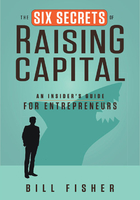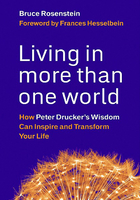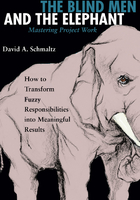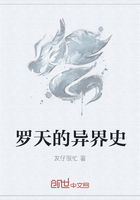Work with What You've Got and Make It Work
I didn't know everything I wanted, but I knew what I was unwilling to live with.
One day after a nonstop morning of working from home for the job I had before I started my business, I stepped away from my desk to take a much-needed bio break. The phone rang and the answering machine picked it up.
Imagine hearing your manager's voice coming at you over the tiny speaker of your answering machine screaming how irresponsible you are because you are not exactly where he expects to find you at an exact moment in time. I had a newborn son, had coordinated day care so I could work from home, and took my responsibility for making a living and contributing to my new family's financial health and well-being seriously. I was one of his top-performing salespeople and the only woman on the team.
What I did next wasn't responsible or logical. I needed this job. I had been an actor and knew that wouldn't pay my bills on a regular basis. I had no backup plan and only a teensy bit of savings. Nevertheless, I called my supervisor back and told him I quit. He told me I couldn't. I did anyway.
“If you are passionate about solving a problem, you will learn any skill necessary to get the job done.”
—Onyeka Obiocha, Director of Innovation, Yale University, Center for Public Service and Social Justice
I couldn't get another job-job (i.e., one that kills your soul to make a buck). Now was the time to make my tiny idea a real business. I had to make it work. That's the day Eco-Bags Products got started for real.
When asked how I started my business, I used to be very quick to say, “I started with nothing and made something.” It sounded bold, and it placed me in the “rags to riches” myth category. But it was a lie. Not only was it not my truth, it perpetuated larger cultural myths around being an entrepreneur. I wasn't honest with myself, and I was misleading others.
What Do You Have? Something vs. Nothing
Over the years, I dug a little deeper into what I was calling “nothing” and discovered that I did, in fact, start with quite a few “somethings.” When I added these insights to my conversations and public talks, my origin story became more relatable. And if I'd done a deeper dive, making this list when I first started, I would've been more grounded.
Nothing vs. Something
No things vs. Some things
Some vs. Sum
If you're hungry and creative, you can whip up a filling and delicious meal with whatever ingredients you have on hand. Starting out, I knew I didn't have everything I needed. We didn't have a lot in savings, wealthy relatives, or experience working with OPM (other people's money). So I had to be creative and adaptive with what I had on hand.
One thing I had was space—and I also had rent to pay and a baby to care for. So my husband and I found a roommate who was willing to help with childcare in exchange for reduced rent. That helped on two fronts. A roommate was not something we particularly wanted—it was decidedly outside the norm for a young family—but we needed a creative short-term solution to help pay the rent and for childcare as I worked on getting my business off the ground. We did what we needed to do.
Your Nothing Is Actually a Whole Lot of Somethings
When you start something, it's essential to be honest about what you have, what you don't have, and what you need to get. You need to put your personal “nothing” into perspective. Embrace what you have. Don't minimize or overblow it. It'll make you stronger.
Look deeply at what you have—whatever it is, it's what's in your tool kit. It is something to begin to work with, to add and improve on as you build your business. And by honestly evaluating what you have, you can more effectively and efficiently get what you need.
The sum of some is . . . enough.
Exercise: Take Inventory
Take inventory of what you have right now that could help you get your Tiny Business off the ground. I recommend that you make this list in at least two ways:
image The normal and comfortable way—for example, writing it out on pen and paper or your laptop
image An unusual and uncomfortable way—for example, writing left-handed if you're a righty (or vice versa)
The latter is a simple way to get you out of your comfort zone and thinking creatively. When you do something in a new or different way, you slow down. New thoughts and insights occur. If it feels silly or dumb, then you're doing it right!
However you do it, make this list today. It will give you a very clear picture of what you have to work with right now.
Here's my list of what I had when I started. Use it as a guide to create your own.
Family: A husband and a newborn son.
Housing: A two-bedroom apartment in New York City where rent was about a third of our income.
Education: A BA in liberal arts with a major in theater from a well-respected but not Ivy League university.
Friends: Lifelong friends, most living a phone call away.
Family income: My husband was a freelance musician and teacher.
Health insurance: Self-paid.
Skills: Acting and improvisation, sales, retail experience growing up, writing (I did a few low-pay writing gigs with local newspapers in NYC at one point).
Equipment: Landline phone, fax machine, Macintosh SE, and a printer. (This was pre-internet so no email, no Google, not even cell phones!)
Wealthy parents or in-laws: Nope.
Trust fund: Are you kidding?
Savings: A teensy bit.
Good credit: Yes.
Access to credit: Yes (credit cards).
Business connections: Not really. My father had a small retail store I grew up in. I had some friends in video editing, which I thought wasn't applicable. My friends were all creatives: actors and teachers. I didn't think they knew anything more than me.
What Is Enough?
We all have a very complex relationship with money—having it, not having it, not having enough of it. There's never enough.
What I know now that I did not know when I quit my job is that you can't let money shape you. Instead, you need to use money to shape what you want. A close friend, Peter Berley, chef and cookbook author framed this for me years ago. He said:
“Money is energy. It's a tool.”
After years of wrestling with it, I finally got money where it belonged: in my tool kit.
Don't get trapped into thinking it's all about the money. It's not always about the money. Tiny Business understands money as an asset, an energetic and necessary tool to building something. It's an essential piece in your tool kit, but it's not the only driver. And in the absence of money, you can become (and will have to be) a super-creative problem solver. Think of problems as the blank canvas for you, the entrepreneur.
Until you build a healthy relationship with how much money is enough for your life—what you need to live on versus what you want to live with—you will not be able to harness the energy of money and use it efficiently. You need to know your number, your personal financial baseline as well as what is needed for your Tiny Business.
What's the least amount you need to live and work with?
What's the least amount you can live and work with and still have some fun?
I recommend allocating 10 percent of your baseline toward savings (room to breathe) and 10 percent toward fun (room to live).
You can create something of substance from a tiny sum.
Who Do You Know? (And What Do They Know?)
You will read a lot in this book about the importance of relationships. When you're starting out, you may think you are independent but really you are interdependent.
Whether you're sparked to stay local with a community café or build an app for rounding up online purchases for nonprofit giving, you are part of a growing ecosystem of people who understand that business is a currency for ideas and for solving big problems. You can do good and do well at the same time—and you need skills and services that other folks have.
Research your favorite brands. Look for the ones that seem to share your values. Find their origin stories, the kernels that reveal their “whys,” and look at how they started. Find what sparked them. Identify what you would like to keep for yourself and what you don't need or want.
Who are the people behind the businesses that are doing things differently, rooting their decisions in more than profit, and with an understanding that profit can be used as a force for good? Businesses like Eco-Bags Products were created and thrive at this intersection.
“Individually you can make a difference. Together we create an impact.”
—Jeff Kirschner, Social Entrepreneur, Litterati
Thirty years ago, I worked in a vacuum. It was a challenge to simply get recycled copy paper and nontoxic inks, let alone flexible work hours. That was then. Now, I have a “tribe,” as Seth Godin calls it.
There's an awake and enlightened group of business-people with a welcome mat at the door. It's a growing movement with the belief that when the tide rises, all boats rise. It's a space that's collaborative and competitive. It's a global movement of B Corps: business as a force for good.[2] Whether you want to grow and sell a Tiny Business or inspire other businesses with your actions, it's important to know you are not alone. Come join us.
“Never doubt that a small group of thoughtful, committed citizens can change the world; indeed, it's the only thing that ever has.”
—Margaret Mead
Get the Lay of the Land
Who do you know who has a business that's like the one you want to start? If you don't know anyone personally, maybe you know someone in your city or town, or an internet acquaintance. Figure out what you're most curious about or in need of and ask if they have a few moments to spend with you.
Questions you can ask include:
image What inspired you to start?
image What motivates you?
image What was and is your financial picture?
image Where are you now versus where you want to be?
On a scale of 1 to 10, are you building your business on your own terms?
image What is your biggest obstacle to doing so?
image How many hours do you work per week?
image What does success mean to you?
If asking a local business owner questions seems too daunting or you cannot get their attention, look for meet-ups with businesspeople—for example, women in business associations, chamber of commerce events, or your local Rotary Club. Go with the intention of listening, with the possibility that you may (or may not) make a connection with someone.
Networking = Expanding your net and working it
Get to know the field you're playing in. Listen and learn the language of business, regardless of whether you want to play by the rules or make up your own. Go to local meet-ups. Talk to people you don't know and who don't know you. Have fun with it.
“One single real connection is what satisfies when I go to an event. I never know how that connection will play out but somehow it always does, in time.”
—Hugh Locke, Social Business Entrepreneur, Smallholder Farmers Alliance—Haiti
Get Comfortable Being Uncomfortable
You may feel uncomfortable going to your first business event—like a total outsider. You are not the only person in the room who feels this way. Don't flee. Make yourself stay. Be consistent and show up at the same type of meeting on a regular basis. Just by showing up, you begin to weave yourself int o the fabric of the community you want to be a part of.
If you know there's someone in the room you absolutely need to talk to but you haven't met, you can be freaked out or joyful. It's always a choice. If you have an intention to walk into the room and a practice to keep you grounded (like a mantra), you will be okay in the moment. Throw your shoulders back and say “I am the Queen of England” to yourself before you walk into the room. It works not only by giving you strength and focus to fulfill your agenda (e.g., meeting that essential person) but also by lightening things up.
Now try a different approach. Walk into the room with no agenda and know that you are interesting (enough) and that something you say will connect with another person. How can you do that? Ask an unusual question. Or do like my friend Drew: find someone standing alone, walk up to them, and say, “I don't know anyone. What brings you here?”
image
“How about we just curl up inside and watch a movie?”
The more you walk into rooms without an agenda, the more comfortable you'll become walking into rooms.
Five Tips for Walking into a Room with Strangers
1. Make sure you're not thirsty or hungry or tired (ensure your physical body is satiated).
2. Pick a mantra or song to get you out of your head.
3. Take a few centering breaths and walk into the room.
4. Commit to listening versus talking.
5. Be curious.
Go to these meet-ups to learn, to find a community where you can exchange ideas, to find a place to land. Commit to talking to at least one person the first time and maybe two the next. Be prepared to talk about your idea in whatever shape it's in. Talk about as much of it as you're comfortable with or be expansive and make it all up. Listen and watch for what people are responding to. Is it your idea or your energy, or are they simply being polite?
If you're nervous someone will steal your idea, talk in the abstract until you're comfortable enough to share more details. My sense is that everyone has the same ideas at the same time anyway—if they're tuned in.
But not everyone has the interest or initiative to get started. Why not? Because not everyone knows what's in their tool kit to make it happen.















